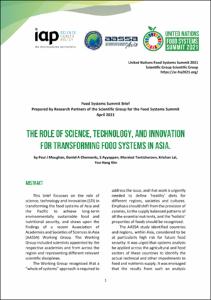Moughan, Paul J.; Chamovitz, Daniel A.; Ayyappan, S.; Tanticharoen, Morakot; Lal, Krishan; Kim, Yoo Han: The Role of Science, Technology, and Innovation for Transforming Food Systems in Asia : Food Systems Summit Brief Prepared by Research Partners of the Scientific Group for the Food Systems Summit April 2021.
Online-Ausgabe in bonndoc: https://doi.org/10.48565/scfss2021-tf41
Online-Ausgabe in bonndoc: https://doi.org/10.48565/scfss2021-tf41
@article{handle:20.500.11811/9150,
doi: https://doi.org/10.48565/scfss2021-tf41 ,
author = {{Paul J. Moughan} and {Daniel A. Chamovitz} and {S. Ayyappan} and {Morakot Tanticharoen} and {Krishan Lal} and {Yoo Han Kim}},
title = {The Role of Science, Technology, and Innovation for Transforming Food Systems in Asia : Food Systems Summit Brief Prepared by Research Partners of the Scientific Group for the Food Systems Summit April 2021},
publisher = {Center for Development Research (ZEF) in cooperation with the Scientific Group for the UN Food System Summit 2021},
year = 2021,
month = apr,
note = {This brief focusses on the role of science, technology and innovation (STI) in transforming the food systems of Asia and the Pacific to achieve long-term environmentally sustainable food and nutritional security, and draws upon the findings of a recent Association of Academies and Societies of Sciences in Asia (AASSA) Working Group. The Working Group included scientists appointed by the respective academies and from across the region and representing different relevant scientific disciplines.
The Working Group recognised that a “whole of systems” approach is required to address the issue, and that work is urgently needed to define ‘healthy’ diets for different regions, societies and cultures. Emphasis should shift from the provision of calories, to the supply balanced patterns of all the essential nutrients, and the ‘holistic’ properties of foods should be recognised.
The AASSA study identified countries and regions, within Asia, considered to be at particularly high risk for future food security. It was urged that systems analysis be applied across the agricultural and food sectors of these countries to identify the actual technical and other impediments to food and nutrients supply. It was envisaged that the results from such an analysis would be used to formulate a ‘blueprint’ for agricultural and food STI in Asia.
Overarching recommendations were the establishment of a trans-national funding mechanism for the entire region focussing on targeted inter-disciplinary STI, and the establishment of regional Centres of Excellence for research, education and extension focussing on the identified key areas of opportunity.
It was concluded that there is an urgent need for investment and action.},
url = {https://hdl.handle.net/20.500.11811/9150}
}
doi: https://doi.org/
author = {{Paul J. Moughan} and {Daniel A. Chamovitz} and {S. Ayyappan} and {Morakot Tanticharoen} and {Krishan Lal} and {Yoo Han Kim}},
title = {The Role of Science, Technology, and Innovation for Transforming Food Systems in Asia : Food Systems Summit Brief Prepared by Research Partners of the Scientific Group for the Food Systems Summit April 2021},
publisher = {Center for Development Research (ZEF) in cooperation with the Scientific Group for the UN Food System Summit 2021},
year = 2021,
month = apr,
note = {This brief focusses on the role of science, technology and innovation (STI) in transforming the food systems of Asia and the Pacific to achieve long-term environmentally sustainable food and nutritional security, and draws upon the findings of a recent Association of Academies and Societies of Sciences in Asia (AASSA) Working Group. The Working Group included scientists appointed by the respective academies and from across the region and representing different relevant scientific disciplines.
The Working Group recognised that a “whole of systems” approach is required to address the issue, and that work is urgently needed to define ‘healthy’ diets for different regions, societies and cultures. Emphasis should shift from the provision of calories, to the supply balanced patterns of all the essential nutrients, and the ‘holistic’ properties of foods should be recognised.
The AASSA study identified countries and regions, within Asia, considered to be at particularly high risk for future food security. It was urged that systems analysis be applied across the agricultural and food sectors of these countries to identify the actual technical and other impediments to food and nutrients supply. It was envisaged that the results from such an analysis would be used to formulate a ‘blueprint’ for agricultural and food STI in Asia.
Overarching recommendations were the establishment of a trans-national funding mechanism for the entire region focussing on targeted inter-disciplinary STI, and the establishment of regional Centres of Excellence for research, education and extension focussing on the identified key areas of opportunity.
It was concluded that there is an urgent need for investment and action.},
url = {https://hdl.handle.net/20.500.11811/9150}
}






